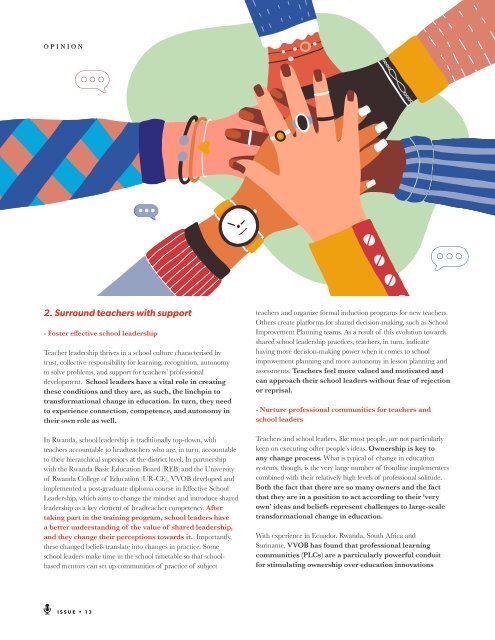The Blue DOT Issue 13
Reimagining Education: Beyond the Rhetoric
Reimagining Education: Beyond the Rhetoric
You also want an ePaper? Increase the reach of your titles
YUMPU automatically turns print PDFs into web optimized ePapers that Google loves.
OPINION<br />
2. Surround teachers with support<br />
- Foster effective school leadership<br />
Teacher leadership thrives in a school culture characterised by<br />
trust, collective responsibility for learning, recognition, autonomy<br />
to solve problems, and support for teachers’ professional<br />
development. School leaders have a vital role in creating<br />
these conditions and they are, as such, the linchpin to<br />
transformational change in education. In turn, they need<br />
to experience connection, competence, and autonomy in<br />
their own role as well.<br />
In Rwanda, school leadership is traditionally top-down, with<br />
teachers accountable to headteachers who are, in turn, accountable<br />
to their hierarchical superiors at the district level. In partnership<br />
with the Rwanda Basic Education Board (REB) and the University<br />
of Rwanda College of Education (UR-CE), VVOB developed and<br />
implemented a post-graduate diploma course in Effective School<br />
Leadership, which aims to change the mindset and introduce shared<br />
leadership as a key element of headteacher competency. After<br />
taking part in the training program, school leaders have<br />
a better understanding of the value of shared leadership,<br />
and they change their perceptions towards it. Importantly,<br />
these changed beliefs translate into changes in practice. Some<br />
school leaders make time in the school timetable so that schoolbased<br />
mentors can set up communities of practice of subject<br />
teachers and organize formal induction programs for new teachers.<br />
Others create platforms for shared decision-making, such as School<br />
Improvement Planning teams. As a result of this evolution towards<br />
shared school leadership practices, teachers, in turn, indicate<br />
having more decision-making power when it comes to school<br />
improvement planning and more autonomy in lesson planning and<br />
assessments. Teachers feel more valued and motivated and<br />
can approach their school leaders without fear of rejection<br />
or reprisal.<br />
- Nurture professional communities for teachers and<br />
school leaders<br />
Teachers and school leaders, like most people, are not particularly<br />
keen on executing other people’s ideas. Ownership is key to<br />
any change process. What is typical of change in education<br />
systems, though, is the very large number of frontline implementers<br />
combined with their relatively high levels of professional solitude.<br />
Both the fact that there are so many owners and the fact<br />
that they are in a position to act according to their ‘very<br />
own’ ideas and beliefs represent challenges to large-scale<br />
transformational change in education.<br />
With experience in Ecuador, Rwanda, South Africa and<br />
Suriname, VVOB has found that professional learning<br />
communities (PLCs) are a particularly powerful conduit<br />
for stimulating ownership over education innovations<br />
while maintaining a good amount of fidelity in their<br />
implementation in different classrooms and schools. As<br />
long as these communities have certain characteristics, that is. <strong>The</strong><br />
role of the PLC facilitators is key to ensuring a good mix of formal<br />
and informal contacts, unlocking members’ expertise or pulling in<br />
expertise from elsewhere when needed, and making certain that<br />
conversations are in-depth and sufficiently strong and frequent,<br />
so that participants go beyond spreading information and ideas<br />
(‘advice’) and move to spreading innovations through collective<br />
problem-solving and building complex, non-routine knowledge.<br />
Who facilitates the PLCs is quite context-dependent, we learned, as<br />
there is much variation in the human resources available in given<br />
education systems. Across the board, it has been necessary to invest<br />
in training and coaching the facilitators.<br />
- Strengthen relations between schools and their<br />
communities<br />
<strong>The</strong>re is quite a bit of research evidence to demonstrate that<br />
community and parental involvement in schools can have a<br />
positive effect on education delivery and quality. Some conditions<br />
do need to be in place. <strong>The</strong>se stakeholders need to be aware of<br />
their right to engage in the quality of their children’s schooling<br />
and be provided with relevant information that enables them<br />
to do so in a meaningful way. <strong>The</strong> pathways for engagement<br />
also need to be clear. Interestingly, the available evidence also<br />
suggests that building stronger links between schools and<br />
the community – for example, by engaging parents as<br />
teaching assistants – can help to enhance the status of<br />
teaching and, indirectly, the status of teaching and teacher<br />
motivation. Effective school leaders will therefore focus on<br />
strengthening these relations as a way to surround teachers with<br />
support. Strong school-community relations also open<br />
up a space for dialogue on what education is expected<br />
to accomplish and how such accomplishments should<br />
be measured. Such conversations are necessary to<br />
accomplish a shift to a whole brain approach to education.<br />
<strong>The</strong>y can trigger greater interest in social and emotional learning;<br />
help teachers better understand the needs of all learners, including<br />
the most marginalized and at risk; inspire community leaders to<br />
strengthen the ties between education, health, and social policy;<br />
and help parents and guardians in supporting social and emotional<br />
learning at home.<br />
3. Do accountability differently<br />
- Trust teachers and school leaders as professionals<br />
Even the best-intentioned governments can find it hard to truly trust<br />
educators as professionals. In a working paper titled “<strong>The</strong> limits of<br />
accounting-based accountability in education (and far beyond)”,<br />
Dan Honig and Lant Pritchett refer to the classic principal-agent<br />
problem to understand the dilemma: <strong>The</strong> boss (principal) needs<br />
to rely on employees (agents) to get things done but doesn’t fully<br />
know what they’re doing. Agents may not share the principal’s<br />
goals or may act in ways that do not advance the principal’s goals,<br />
even when these agents, too, may have the best intentions. <strong>The</strong><br />
principal can then attempt to monitor and control the agents in<br />
a variety of ways to ensure that agents act in ways desired by the<br />
principal. For instance, policymakers concerned about teacher<br />
absenteeism – indeed a serious problem in many schools across the<br />
globe – may respond by installing cameras in classrooms to check<br />
whether teachers are in attendance. But just as too little control is a<br />
risk, so is too much. In some instances, it is possible to verify<br />
progress from a distance and monitor meaningfully on<br />
the basis of a few well-selected quantitative targets. That<br />
is not likely, however, to give a good picture of facilitating<br />
human flourishing through education. For this, an alternative<br />
for policymakers would be to invest in creating a system-wide, deep,<br />
and shared understanding of expectations and joint purpose and<br />
to put greater trust in the professional judgment of teachers and<br />
school leaders.<br />
- Enhance ‘thick’, horizontal accountability<br />
‘Real’ accountability that will drive systems<br />
transformation in education (and far beyond) often<br />
is based on ‘thick’ description of processes, outputs,<br />
and outcomes, so argue Honig and Pritchett. Not all of<br />
this information needs to move up in the education hierarchy.<br />
It is important to create scope for local-level utilisation of<br />
the information by giving account inside schools and school<br />
communities as well as to parents, guardians, and learners, with<br />
the aim of fostering an environment for continuous learning and<br />
improving performance. This will be especially impactful when<br />
local stakeholders – including teaching staff – already committed<br />
to quality education are empowered. It is also for this reason<br />
that celebrating positive deviance is so important. To reduce the<br />
administrative burden on educators, district, provincial, or central<br />
Ministry of Education staff could be engaged through look-andlearn<br />
visits, study tours, hearings, and regular conversations, as a<br />
complement to the quantitative data they receive on a few wellselected<br />
indicators. Such ‘thick’ accountability could also be<br />
more receptive to a range of instruments for measuring<br />
social and emotional learning, such as self-reports;<br />
teacher, parental, and peer evaluations; and so on.<br />
For sure, implementing these three lines of action of sincere<br />
concern for teachers – and learners! – is not an easy feat. But I<br />
believe that if we want to truly reimagine education systems, then<br />
we owe it to ourselves and future generations to be(come) the<br />
everyday heroes that challenge the status quo.<br />
OPINION<br />
ISSUE • <strong>13</strong><br />
2 7

















